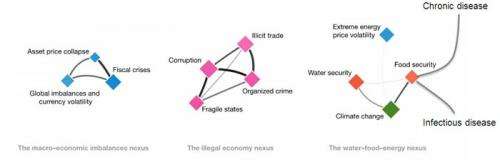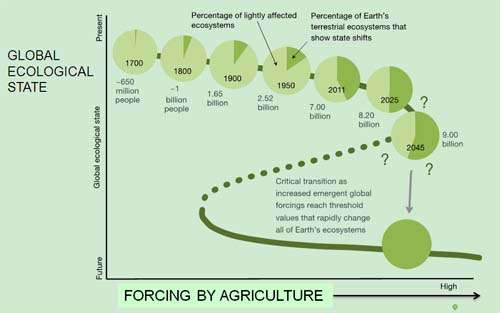Calculating the global risk to our health

A physicist turned soil expert calculating the journey of food from the ground to our kitchen tables says understanding this relationship in context with things like corruption and climate change will help us solve complex issues related to health and food security.
Asset price collapses, fiscal crises, corruption, organised crime, climate change, water security, extreme energy price volatility, food security and chronic disease. What do they all have in common? Well, apparently a lot.
We tend to take a very linear view of problem solving choosing to isolate issues to work out solutions, but according to Professor John Crawford from the University of Sydney, it's not that simple.
While it might seem overwhelming to take a holistic view to very serious issues, including the availability of cheap food, water and health, in his recent talk at the Australian Nuclear Science and Technology Organisation, the professor says there are clearly strong links between these separate issues and understanding that concept will help us innovate our way out of problems.
To get a picture of what he means, we need to take a step back. Professor Crawford's interest is in soil. More importantly it's the journey of nutrition from the environment through plants and animals and into our kitchens and us.
Holding the Judith and David Coffey Chair in Sustainable Agriculture at the University of Sydney, he spends a lot of his time uncovering properties in complex living systems that sustain their function in the face of disruption.
What Professor Crawford explained to guests in the AINSE Theatre at ANSTO's Lucas Heights campus is that you learn pretty quick there is more to our health than meets the eye.
"It's important to remember we're a part of the environment. Some of us might look better than others, but at the end of the day we're all connected in the same ways.
"The problem is we've become so disconnected as the world becomes more urbanised.
"Most of us, if we were dropped a couple of hours from habitation without any sustenance we'd be dead within a very short time."
He says part of the problem is we're taking food for granted and by extension how it's produced.

"I want to reposition agriculture in my research in to this role of not only preventing societal health... many of the diseases are caused by our diet... but also to address the way food is produced, which is demonstrably unsustainable and causing significant damage of the ecosystem on which our food depends," he said.
Professor Crawford identifies three major risk nexus that threaten our ability to produce food sustainably and in a way that improves our wellbeing. Referring to a World Economic Forum report on global risk, he says the first two are related to the economy, such as global imbalances and currency volatility. The third relates to water security, energy, climate change and water security, which is directly linked to chronic disease and infectious disease.
He says there is an argument that we have always innovated our way out of trouble. The industrial revolution was a clear example of this boosting agricultural production, but it was at the expense of our future. He says we borrowed from the future to make those gains and are finding it extremely difficult to pay those gains back leading us to uncertain future.
"Consider just one of these links between energy and our capacity to innovate. There have been three liquids driving the economy over the course of our history – water for agriculture… coal and oil during the industrial revolution and liquid credit for the last 50- years.
"The first problem here is that the era of cheap energy has gone. We've extracted all the cheap oil so it's becoming more expensive to get it out of the ground.
"The second thing is liquid credit. We've done a lot of borrowing from our future and now have a lot of paying back to do. Such financial constraints are hampering our ability to adapt and are real and severe.
He identifies two major impacts from these issues - affordable healthcare and affordable old age. They are two things that the era of cheap energy will make things of the past.
So looking forward, how can we solve these problems?
Professor Crawford confesses it is difficult. The link between individuals and global change is networked all the way down, mirroring a map of the universe and it's complex.
But this was not something to fear. Uncertainty should be embraced and that multiple interventions would be required for us to adapt to the threats.
He says the best way to address these issues is adaptation.
We cannot think of it being as simple as 'A' causing 'B'. 'A' and 'B' are part of a causal system. His work has involved identifying key nodes in the complex network.
"We now know that everything depends on its context; from an organism and its context, to the ecosystem and its context and that there are a huge number of interactions.
Research published in Nature recently pointed to the nature of these highly connected systems and illustrating how they can be subject to sudden change.
A graphical illustration in the research paper Approaching a state shift in Earth's biosphere shows the percentage of the earth's ecosystems affected by human agriculture and suggests we will reach a major tipping point around the year 2045 when the earth could be subject to an abrupt change.
"We may be reaching a tipping point when the level of biological forcing can no longer sustain itself and there's a dramatic change in the ecological state."
Of course, the future is uncertain and humans have managed to adapt and innovate before. It is something he hopes this new research field will help to achieve.
Journal information: Nature
Provided by ANSTO















